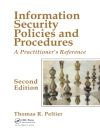This is the first book to present a multidisciplinary approach to cyberterrorism. It traces the threat posed by cyberterrorism today, with chapters discussing possible technological vulnerabilities, potential motivations to engage in cyberterrorism, and the challenges of distinguishing this from other cyber threats. The book also addresses the range of potential responses to this threat by exploring policy and legislative frameworks as well as a diversity of techniques for deterring or countering terrorism in cyber environments. The case studies throughout the book are global in scope and include the United States, United Kingdom, Australia, New Zealand and Canada.
With contributions from distinguished experts with backgrounds including international relations, law, engineering, computer science, public policy and politics, Cyberterrorism: Understanding, Assessment and Response offers a cutting edge analysis of contemporary debate on, and issues surrounding, cyberterrorism. This global scope and diversity of perspectives ensure it is of great interest to academics, students, practitioners, policymakers and other stakeholders with an interest in cyber security.
قائمة المحتويات
What is ‘Cyberterrorism’? Computer and Internet Technology in Legal Definitions of Terrorism.- Understanding, Locating and Constructing ‘Cyberterrorism’.- Rethinking the Threat of Cyberterrorism.- Putting the ‘Cyber’ into Cyberterrorism: Re-reading Technological Risk in a Hyperconnected World.- Dr. Strangeweb: Or How they Stopped Worrying and Learned to Love Cyber War.- Reality Check: Assessing the (Un)Likelihood of Cyberterrorism.- Cyber Threats to Critical Information Infrastructure.- The Citadel and its Sentinels: State Strategies for Contesting Cyberterrorism in the UK.- The Criminalisation of Terrorists’ Online Preparatory Acts.- Adaptive Responses to Cyberterrorism.












